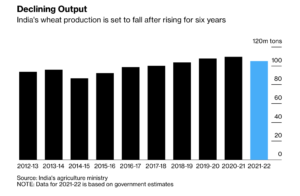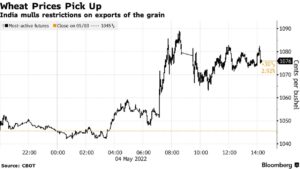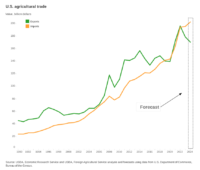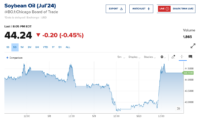Bloomberg's Clarice Couto reported this past Friday that "a surprising tax change in agriculture powerhouse Brazil has the potential to make soy grown in the world’s largest bean exporter less…
After Hottest March on Record, India Considers Wheat Export Restrictions- Wheat Prices Climb
Bloomberg writers Pratik Parija and Shruti Srivastava reported yesterday that, “India is considering restricting wheat exports as severe heat waves have damaged crops, exacerbating tight global supplies after the war in Ukraine sent food inflation soaring.

“The South Asian nation experienced its hottest March on record, shriveling the wheat crop that the world was relying on to alleviate a global shortage. To safeguard domestic supplies, the government is considering limiting wheat exports, according to a person with knowledge of the matter.”

“The move would also add to a wave of crop protectionism around the world as governments seek to protect their own food supply amid soaring prices and fears of shortages. That has the potential to worsen global food inflation, which is already at a record and surging at a rampant pace,” the Bloomberg article said.
Reuters writer Christopher Walljasper reported yesterday that, “Chicago wheat futures soared on Wednesday on reports that India, a major world producer, would restrict exports as a drought threatened its production even as the nation had hoped to fill a global export gap created by the ongoing war in Ukraine.”
Walljasper noted that, “Earlier this week, India cut its wheat output forecast to 105 million tonnes, from the 111.3 million tonnes estimated in February, potentially marking the first production decline after five consecutive years of record harvests.”

Also yesterday, Bloomberg writer Kim Chipman reported that, “Chicago wheat futures for July delivery jumped as much as 4.2% before settling the day up 3% higher at $10.765 a bushel, the biggest increase since April 8. Milling wheat in Paris also rose.
‘India had one of the few remaining significant stocks of wheat available to replace Ukrainian, and possibly Russian, supplies,’ said Scott Irwin, an agricultural economist at the University of Illinois. ‘The sharp jump in prices today is all you need to know about the importance of this possible move by India.’
With respect to U.S. wheat production, DTN writer Emily Unglesbee reported this week that, “Wheat is a resilient crop, but after a dry fall and winter in the Great Plains, and an equally parched spring plagued by days with 60-mph winds, even the hardiest stands are approaching their limits.”
“Large swaths of the major winter wheat growing regions in the U.S. are facing the likelihood of below average yields, as drought has intensified across the Plains this spring, with summer forecasts bringing little hope for reprieve,” the DTN article said.
Also this week, Reuters writer Pavel Polityuk reported that, “Ukraine’s 2022 wheat harvest is likely to be ‘close‘ to last year’s level of more than 32 million tonnes, APK-Inform agriculture consultancy quoted the National Academy of Agrarian Sciences of Ukraine as saying.
“Ukraine sowed 6.5 million hectares of winter wheat for the 2022 harvest but agriculture officials have said some of the area could not be harvested due to the Russian invasion.”
Polityuk added that, “Ukraine is among global major wheat growers and exporters but its exports could be sharply reduced this season and the next due to hostilities and blocked Black Sea ports.”
In more detailed reporting regarding Ukrainian export logistics, Wall Street Journal writers Nancy A. Youssef and Drew Hinshaw reported in yesterday’s paper that,
[Polish President Andrzej Duda] said he and [Ukrainian President Volodymyr Zelensky] have also been discussing how to get wheat from Ukraine into international markets, using Polish seaports to circumvent Russian naval vessels blocking Ukraine’s shipping routes along the Black Sea. Ukraine exports about 12% of the world’s wheat, especially to North African buyers, and its economy is heavily dependent on those agricultural shipments.
“Next month, Mr. Duda plans to visit Egypt, the world’s largest wheat importer, to help coordinate Ukraine’s exports. He has also been discussing Ukraine’s wheat exports with United Nations Secretary-General António Guterres and the World Food Program and the International Fund for Agricultural Development, both U.N. agencies.”
Meanwhile, Reuters writer Felix Onuah reported this week that, “U.N. Secretary-General Antonio Guterres said on Wednesday the problem of global food security could not be solved without restoring Ukrainian agricultural production and Russian food and fertilizer output to the world market.”
“‘There is really no true solution to the problem of global food security without bringing back the agriculture production of Ukraine and the food and fertilizer production of Russia and Belarus into world markets despite the war,’ he said.”







